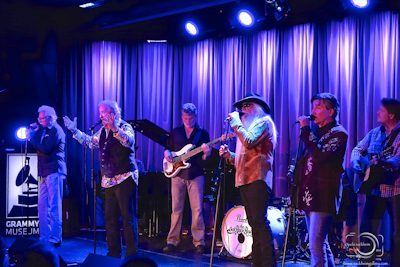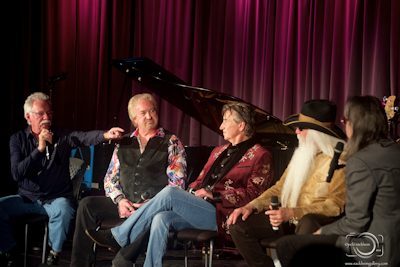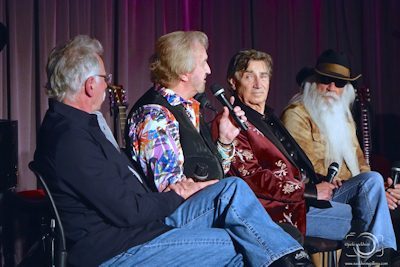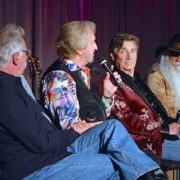OAK RIDGE BOYS AT GRAMMY MUSEUM
An Evening With The Oak Ridge Boys
At The Grammy Museum Clive Davis Theater – February 15, 2018~ 8:00 PM
Got Any Oak Ridge Boys?
 I don’t think Elvira is in Rise Up Singing~ it’s made too much money. But for anyone who loves gospel and country music the Grammy Museum was the only place to be last night, as the reigning kings of both—Country Music Hall of Fame members and five-time Grammy-winning The Oak Ridge Boys—held forth for an hour-and-a-half riveting conversation and magnetic live performance of their gospel, crossover and country-rock hits over the last four decades. It was a once-in-a-lifetime opportunity (their only Los Angeles stop on their 2018 tour) to hear the upfront, backseat, and inside story of what lay behind their amazing success story—a band that has been in business in a half dozen previous incarnations going all the way back to World War II, when they began as the Oak Ridge Quartet—a gospel group based in Oak Ridge, Tennessee. Since then twenty-nine members have passed through their golden gate, leaving the mainstay current lineup of four (which produced their most world-famous country and crossover hits (such as Elvira, Bobby Sue and American Made) since 1973: Duane Allen (lead), Joe Bonsall (tenor) William Lee Golden (baritone—and Leon Russell lookalike), and Richard Sterban (bass).
I don’t think Elvira is in Rise Up Singing~ it’s made too much money. But for anyone who loves gospel and country music the Grammy Museum was the only place to be last night, as the reigning kings of both—Country Music Hall of Fame members and five-time Grammy-winning The Oak Ridge Boys—held forth for an hour-and-a-half riveting conversation and magnetic live performance of their gospel, crossover and country-rock hits over the last four decades. It was a once-in-a-lifetime opportunity (their only Los Angeles stop on their 2018 tour) to hear the upfront, backseat, and inside story of what lay behind their amazing success story—a band that has been in business in a half dozen previous incarnations going all the way back to World War II, when they began as the Oak Ridge Quartet—a gospel group based in Oak Ridge, Tennessee. Since then twenty-nine members have passed through their golden gate, leaving the mainstay current lineup of four (which produced their most world-famous country and crossover hits (such as Elvira, Bobby Sue and American Made) since 1973: Duane Allen (lead), Joe Bonsall (tenor) William Lee Golden (baritone—and Leon Russell lookalike), and Richard Sterban (bass).
Grammy Museum Executive Director Scott Goldman broke the silence at a few minutes after 8:00pm to a packed house with “It’s Show Time! Good Evening!” It was apparent he was as excited to be there as we were—you don’t see and hear up close and personal the creators of Y’all Come Back Saloon and Elvira every night of the week. This was a rare and very special evening—even for the Grammy Museum. Mr. Goldman led the four pillars of the group (they also have a five-piece band called “The Mighty Oaks” who joined them later on for the live performance) into an amazing tell-all extemporaneous look back at their extraordinary career—from the depths of depression when a previous member committed suicide—to their inspiring success story of winning five Grammys and eventually being inducted into both the Gospel Music Hall of Fame and most recently, in October, 2015, the Country Music Hall of Fame.
Bass Richard Sterban summed up his crystal clear standard for what they are looking for as a group: “It all starts with a great song—without that you have nothing. What I am constantly looking for—in any genre, whether its gospel, country, or rock and roll—is three minutes of magic.” “Three minutes of magic,” the phrase he kept coming back to in emphasizing the key to their success. He said, “We don’t cut albums—we cut every song as a single—there is no deadweight or filler on our records. If we don’t fully believe in each song, we don’t cut it.” As a recording artist, that’s a high standard to meet. I know. I’m so grateful just to write a song I have no compunction cutting it. I only let my critical faculty come into play when it’s time to put an album together out of all the songs that have piled up. So Richard Sterban raised my sights almost immediately—to take a harder look at the songs I write. After all, The Oak Ridge Boys have had 17 #1 hits and sold 40 million records.
“Got any Oak Ridge Boys?” the culminating line uttered by James Spader to Susan Sarandon’s Nora that reaches across the great divide between them and brings their love story to a happy ending is what brought me to the Grammy Museum this evening. It’s one of the great final lines of any romantic drama, and perfectly sums up the entire film White Palace (the hamburger joint Nora works in) in the moment that transcends the social, class and religious conflicts that have kept them apart on the way from their initial lust being transformed into the growing recognition of true love. Any music group that can do that, I thought, is worth paying attention to. I was right. The evening’s plethora of insights into what goes into creating great music was far more than I bargained for.
Sometimes it may be as simple as one note that lead singer Duane Allen changed on the final syllable of Elvira—where he made it go up rather than down—which was how it was written. It gave the song more energy and joie de vivre—having been recorded by three well known singers and groups before the Oak Ridge Boys made it a smash hit.
 And it may be a quality that engages the entire group like their complex vocal harmonies which brought the essence of gospel music to the secular songs they wanted also to sing so they wouldn’t “just be heard on Sunday,” but “all seven days of the week” That’s what first put them on the charts back in 1973.
And it may be a quality that engages the entire group like their complex vocal harmonies which brought the essence of gospel music to the secular songs they wanted also to sing so they wouldn’t “just be heard on Sunday,” but “all seven days of the week” That’s what first put them on the charts back in 1973.
It also involved something more emotional, nuanced and hard to pin down—a deep belief in their own art and work—which they attributed to none other than Johnny Cash—and also Paul Simon—both of whom played a pivotal role in their growing success. They met Paul Simon at one of his concerts and told him how they admired his songs and performances. They were shocked when Simon returned the compliment and told them he admired their music too. They allowed as to how much they would enjoy singing with him sometime. Simon seemed nonplussed at the comment, but then a few weeks later he shocked them with an invitation to come into the studio—RCA famed Studio A—where he was recording a new song he wanted them to sing vocal harmonies on. The song was Slip-Sliding Away, and the rest is history. That’s The Oak Ridge Boys on the famous track, and it was just the beginning. They have worked together on and off since.
Their connection to Johnny Cash is more involved and deeply rooted—and goes all the way back to when they were a struggling gospel quartet with little else to recommend them. They happened to live near where Johnny lived in Henderson, Tennessee, and heard that Johnny had lost his opening act—who happened to be the gospel group The Statler Brothers—who were going out on their own to become a solo act. The Oak Brothers front man Duane Allen suggested to Johnny that The Oak Ridge Boys would love to open for him. The next time Cash went to Las Vegas he took them with him—which was a bit of a stretch for a group known for gospel music—and took their audience more than a little getting used to. Now they have broken that barrier many times over and on their upcoming new 2018 album 17th Avenue Revival include a Brandy Clark song they played during their performance with a deliberately mixed message, Pray to Jesus and Play the Lotto. It was delightful and showed that gospel can go down even in Vegas. Indeed it may have helped propel the slogan, “What happens in Vegas stays in Vegas.”
But Johnny Cash gave them far more than an opening act gig—for which they were paid more than they had ever been paid and played for 13 minutes. After one show he called them over and confided to them that he sensed they seemed a little depressed about being his opening act—which was the best job they had gotten to date. He wanted them to know that he believed in them, that he thought they had a great future, and he wanted them to take care of themselves, because he didn’t want to find out somewhere down the line that they had disappeared and he had been the only one who knew how truly great they were. That word of encouragement and recognition from the Man in Black gave them just the assurance they needed, and a few years later when they were voted the Vocal Group of the Year by the Country Music Association they walked right past the presenter and found Cash in the wings and gave him a huge group hug—it was his approval that signified the real award. And John leaned over and growled in his signature bass, “I told you so!” What a beautiful story about both Cash and the Oak Ridge Boys.
That’s how the evening went—one great story after another, but perhaps most revealing and important of all were the detailed accounts of the roots music they paid tribute to in how they see their foundational music—the black gospel and sacred music of the 1940s and ‘50s they began with—the sources of all they do today—groups like the Golden Gate Quartet (who recorded a number of Lead Belly songs) and The Mighty Clouds of Joy.
 Even after all these years and hits they aren’t afraid to try something new—and the most exciting thing of all I learned last night was that sometimes that something new can be old. Their producer for their new album is David Cobb—who has just finished producing John Prine’s new album as well—due out March 23 and setting up his own 2018 tour. David Cobb wanted the Oak Ridge Boys to go back to their roots in terms of the sound quality he was looking for—and that meant abandoning the traditional microphone set up in current recording studios with every performer having their own mike or mikes. Cobb wanted them to all gather round one microphone—so their sound as a group would be emphasized—with all their voices playing off and with each other. That was not news they particularly wanted to hear on one new gospel song—A Brand New Star—they had just finished recording the usual way—and thought they had a finished take on. Cobb was not satisfied; he wanted them to pull out all the microphones except one—and for them to surround it with their four voices. That was their last take—and when it was done they had what Duane Allen called “Three Minutes of Magic.” They did it the same way Hank Williams recorded in the 1940s—on an RCA ribbon mike. What a joy to hear these behind-the-scenes accounts of recording sessions for the best in the business—and learn that what they were striving for was the unmatched sound of 75 years ago when they started. It was a lesson in true curiosity and humility on the part of both their producer David Cobb and the Oak Ridge Boys—keep trying until you get it right, even if it means rediscovering something you thought had long since become passé.
Even after all these years and hits they aren’t afraid to try something new—and the most exciting thing of all I learned last night was that sometimes that something new can be old. Their producer for their new album is David Cobb—who has just finished producing John Prine’s new album as well—due out March 23 and setting up his own 2018 tour. David Cobb wanted the Oak Ridge Boys to go back to their roots in terms of the sound quality he was looking for—and that meant abandoning the traditional microphone set up in current recording studios with every performer having their own mike or mikes. Cobb wanted them to all gather round one microphone—so their sound as a group would be emphasized—with all their voices playing off and with each other. That was not news they particularly wanted to hear on one new gospel song—A Brand New Star—they had just finished recording the usual way—and thought they had a finished take on. Cobb was not satisfied; he wanted them to pull out all the microphones except one—and for them to surround it with their four voices. That was their last take—and when it was done they had what Duane Allen called “Three Minutes of Magic.” They did it the same way Hank Williams recorded in the 1940s—on an RCA ribbon mike. What a joy to hear these behind-the-scenes accounts of recording sessions for the best in the business—and learn that what they were striving for was the unmatched sound of 75 years ago when they started. It was a lesson in true curiosity and humility on the part of both their producer David Cobb and the Oak Ridge Boys—keep trying until you get it right, even if it means rediscovering something you thought had long since become passé.
“Got any Oak Ridge Boys?” asked James Spader—and Susan Sarandon’s Nora replied with certitude, “Honey, I got everything you need.” That’s what the Grammy Museum gave us last night—an oral history interview and brilliant live performance that was indeed “Everything we need.” It was a great night for music—and the history behind it.
With special thanks to Program Director Crystal Larsen of the Grammy Museum for a press pass to cover this event. February 9 the Grammy Museum opened their new exhibit, How Can I Keep From Singing: The Work of Pete Seeger—until September 2018. See FolkWorks home page for information.
And special thanks to photographer Jacki Sackheim (www.sackheimgallery.com) for permission to use her photos from this evening.
Thursday evening February 22 at 7:00pm Ross Altman performs a Sing-Along Civil Rights Concert at the Silver Lake Branch of the Los Angeles Public Library for Black History Month 2018; 2411 Glendale Blvd, L.A. 90039; 323-913-7451; don’t miss it!
Saturday afternoon February 24 at 2:00pm Ross Altman joins author, filmmaker and photographer Byron Motley at the Pintoresca Branch of the Pasadena Public Library for “From Monarchs to Barons: The Legacy of the Negro Leagues,” the Baseball Reliquary’s celebration of Jackie Robinson’s legacy and the history of baseball’s Negro Leagues and players who made them successful in the decades before Major League Baseball’s integration—showing how they were not just about baseball but were an integral part of the modern day Civil Rights Movement~ for Black History Month 2018; in conjunction with the Baseball Reliquary’s month-long exhibit; 1355 North Raymond Ave.; refreshments will be served; free and open to the public—don’t miss it! For further info 626-744-7268
Folk singer Ross Altman has a PhD in Modern Literature from SUNY-Binghamton; he belongs to Local 47 (AFM); Ross may be reached at greygoosemusic@aol.com













